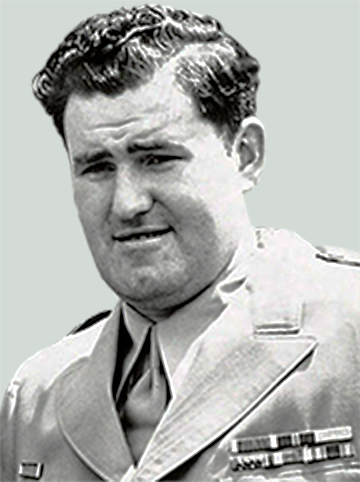Sgt. Charles A. MacGillivary
USCIS Fort Meyers Field Office

U.S. Army Sergeant Charles A. MacGillivary was born in Charlottetown, Prince Edward Island, Canada, on January 7, 1917. At the age of 16, he moved to live with his brother in Boston. He first served as a merchant marine. He volunteered for the Army after the Japanese attacked U.S. naval forces at Pearl Harbor, Hawaii, on December 7, 1941, bringing the United States into World War II.
Fifty years later, Sergeant MacGillivary reflected on his status as a non-U.S. citizen serving in the military. He told the U.S. Senate Subcommittee on Immigration: “[A]n officer asked me and two other immigrants … whether we wanted to become U.S. citizens. [They took us] to a federal courthouse and [swore us] in before a judge. I thought that if I was going to fight for this country, I should be a U.S. citizen.”
During World War II, Sergeant MacGillivary participated in some of the fiercest fighting in Europe. He was assigned to Company I, 71st Infantry Regiment, 44th Infantry Division. His unit fought in the Battle of the Bulge near Woelfling, France, along the border with Germany. On New Year’s Day 1945, elements of the 17th German Panzer Grenadier Division broke through and attacked the 71st Infantry.
The New York Times reported: “Sergeant MacGillivary set out on a one-man mission to destroy the German machine guns menacing his company. A wounded German at the last emplacement hit Sergeant MacGillivary with a machine-gun burst on his left side, but he fired back and killed the man. Then, as he would tell it, ‘I looked down and my arm wasn’t there.’”
President Harry Truman presented the Medal of Honor to Sergeant MacGillivary at the White House on August 23, 1945. The citation reads in part: “Through his indomitable fighting spirit, great initiative, and utter disregard for personal safety in the face of powerful enemy resistance, Sergeant MacGillivary destroyed four hostile machineguns and immeasurably helped his company to continue on its mission with minimum casualties.”
Sergeant MacGillivary returned to the Boston area after the war and worked as a special agent for the Customs Bureau, renamed the U.S. Customs Service in 1973 and now part of U.S. Customs and Border Protection. He served as president of the Congressional Medal of Honor Society from 1973-1975 and spearheaded a project to find other immigrant recipients of the Medal of Honor.
He and his wife, Esther, had three daughters. Esther died in 1999, and he died on June 24, 2000. They are both buried at Arlington National Cemetery.
Note: Information such as spellings of names and dates of birth can sometimes vary in historical and immigration records. In this case, some of Sergeant MacGillivary’s documents list his last name as “MacGillivray” and his birth year as 1916 rather than 1917.
